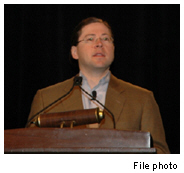Schwartz: Blogs are essential for leadership


Schwartz noted that the convenience of blogging--instant publishing--underlies the power of the medium, easily engaging with a broad marketplace. "[Blogs] are part of leveraging our corporate culture as a competitve weapon and reaching and cultivating a community," Schwartz said. "It stitches together the company and the community."
He also said that the distinction between intranet and extranet communications will dissolve. "Over time, more of what we do will be external and public," Schwartz said. "It's all about the level of authentication on the network." Mena Trott of Six Apart disagreed with Schwartz on the notion that all blogs, and associated conversations, should be public. "Conversations with smaller audiences are different than what you will have with a public audience," Trott said. "It's a different conversation."
Given that any time executives send an e-mail blast to employees it typically ends up in the public domain, being more direct and transparent is more credible and helps build dialog with an extended community that includes employees, customers, partners, fans and the press. Amy Wohl asked Schwartz whether allowing competitors to see internal communications, such as giving kudos to specific employees, could make those employees more susceptible to poaching by competing firms. Schwartz responded: "[Competitors' employees] can also see if I am more compelling than their leaders."